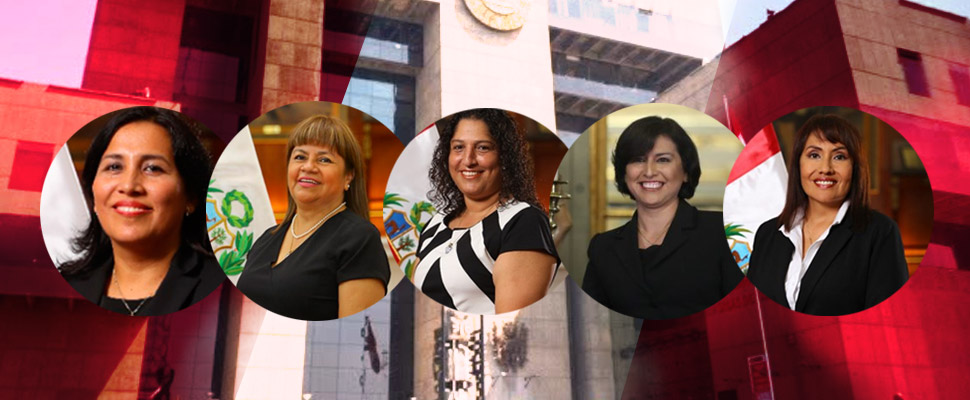Peru: commited with women in politics
Listen this article
Last Friday, Maria Jara was appointed as Minister of Transportation, which made the Peruvian ministerial cabinet the first in its history with a majority of women

On March 11, the government of the current Peruvian president, Martín Vizcarra, appointed a joint ministerial cabinet, made up of nine men and nine women. This followed the president's intention mentioned three days earlier, at the Women's Day ceremony in San Juan de Miraflores, during which he claimed, responding to criticism that his cabinet only had five women, that "there must be more and they to see more, because we have to increase until we reach parity".
Leer en español: Perú: una apuesta por las mujeres en la política
#GabineteDelSolar Este es el Gabinete de Ministros conducido por Salvador del Solar https://t.co/CJ5hJ3G84w pic.twitter.com/q9ccen11Gq
— Agencia Andina (@Agencia_Andina) March 11, 2019
However, on April 26, the president announced that the person who would replace Edmer Trujillo, who resigned after the conflict at the large Las Bambas copper mine, according to EFE, as Minister of Transportation and Communications would be the lawyer María Jara. This decision carries the intention of parity even further since it is the first time in this country that this situation occurs: 10 women and 8 men in the cabinet.
The precedents in Peru had reached the point of a joint government, but never a female majority. For example, the ministerial cabinet of former President Ollanta Humala, nowadays investigating the Odebrecht corruption case, was the first to bet on parity. Prior to that, no government had considered the idea of total equality, according to an RFI article.
Who are the women that make it up?
#GabineteDelSolar Junto a Del Solar son ocho las carteras con nuevos ministros https://t.co/CJ5hJ3G84w pic.twitter.com/wkQ5vYbdiD
— Agencia Andina (@Agencia_Andina) March 11, 2019
As it is not enough to mention that the Peruvian government met a parity quota and even surpassed it, it must be mentioned who are some of the women who are part of this cabinet, according to the official website of the Peruvian government:
Flor Pablo Medina (Minister of Education): Graduated from the Universidad Mayor de San Marcos, with a specialty in Language and Literature, Medina has more than 20 years of experience in public management. She has held important positions as Regional Director of Education of Metropolitan Lima and National Director of Primary Education, both in the Ministry of Education. He also has postgraduate studies in Public Management.
Elizabeth Zulema Tomás Gonzáles (Ministry of Health): With medical studies and specialized in anesthesiology, Gonzales has 28 years of professional experience, of which 13 have been in the public sector. In addition to having been the general director of the National Institute of Child Health of San Borja, she has worked as a teacher at the Federico Villareal University and the Ricardo Palma University. He has a master's degree in Health Administration and Hospital Management, and a doctorate in Medicine.
Fabiola Muñoz Dodero (Ministry of Agriculture and Irrigation): Lawyer with a Master's degree in Social Policy and a diploma in Intercultural Education, Muñoz has extensive experience in the environmental sector. She has held positions as executive director of the National Forestry and Wildlife Service – SERFOR, and director of the General Directorate of Forestry and Wildlife – DGFFS, in addition to having been a consultant to WWF Peru.
Sylvia Elizabeth Cáceres Pizarro (Ministry of Labor and Employment Promotion): Lawyer from the Catholic University of Peru, Master in Management and Analysis of Public Policies, Cáceres has focused her career in the public sector. For example, she has served as superintendent of SUNAFIL and adviser to the Ministry of Women and Vulnerable Populations or as technical secretary of the National Labor Council.
María Esperanza Jarra Risco (Ministry of Transport and Communications): Being the last person to be added to the cabinet, Jarra has a degree in Law, both at the undergraduate and master's level, at the Catholic University of Peru. As it has been dedicated to the public domain, especially regarding transportation, it has held positions as general director of land transport (DGTT) of the Ministry of Transport and Communications, or holder of the Superintendence of Land Transport of People, Goods, and Cargo (Sutran).
It might interest you: Peru: an institutionality permeated by corruption
Is there finally a bet for parity?
As university professor Ivan Lanegra states in his Twitter account:
No es que sea "difícil" identificar mujeres con el perfil para ser ministras. Lo que ocurre es que estamos tan acostumbrados a no pensar en ellas para los altos pueblos públicos que nos cuesta abrir bien los ojos.
— Ivan Lanegra (@ilanegra) March 11, 2019
This statement puts the finger on the problem regarding the problem of sexism, which in Latin America is deeply marked. Therefore, it is not only a question of the government appointing women in high positions in the public sector, but also that same spirit should be moved to the private sector. Thus, in all the labor sectors, the mentality that has dominated power relations that have been perpetuated for centuries can be changing.
As Martín Vizcarra said in his declaration for Women's Day, the true revolution of the 21st century is when it is "that allows us to find justice and equity between men and women".
LatinAmerican Post | Juan Gabriel Bocanegra
Translated from "Perú: un gabinete con mayoría de mujeres, ¿un paso hacia la paridad?"





